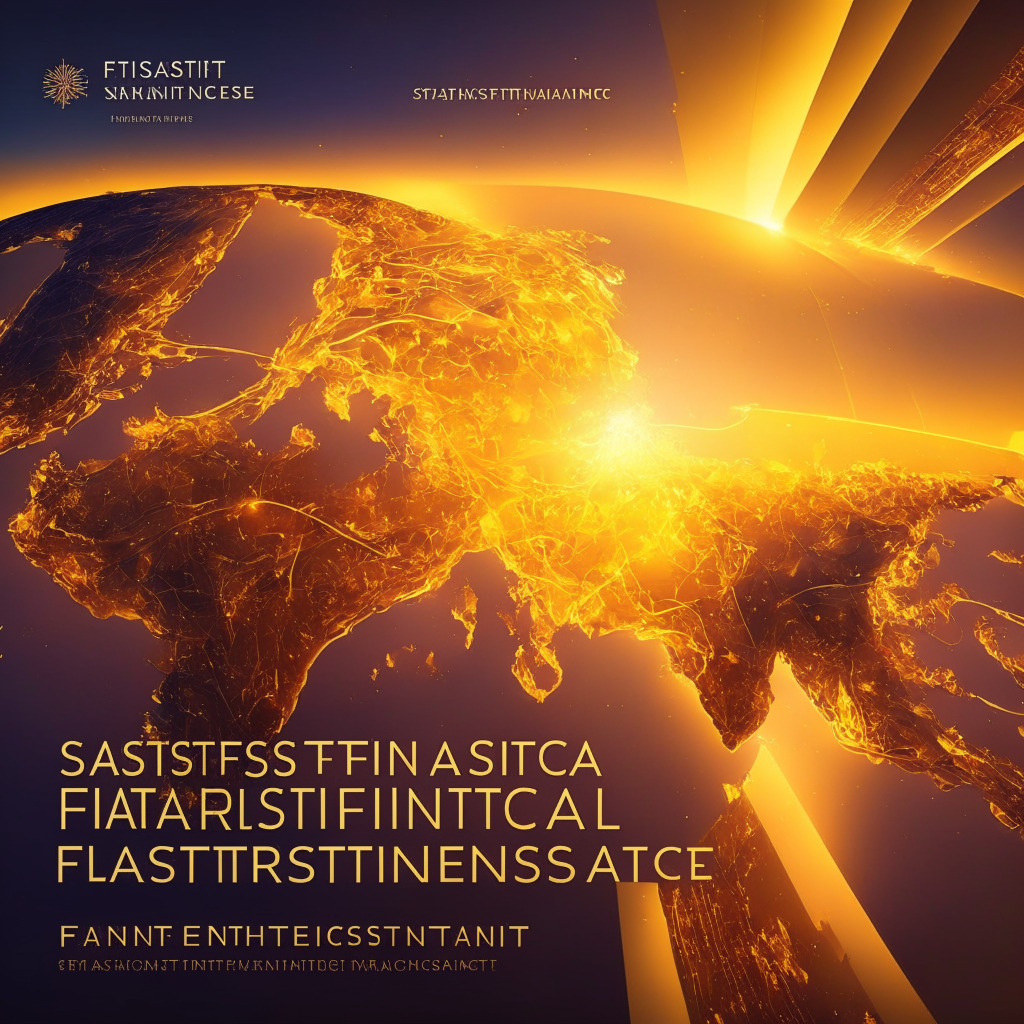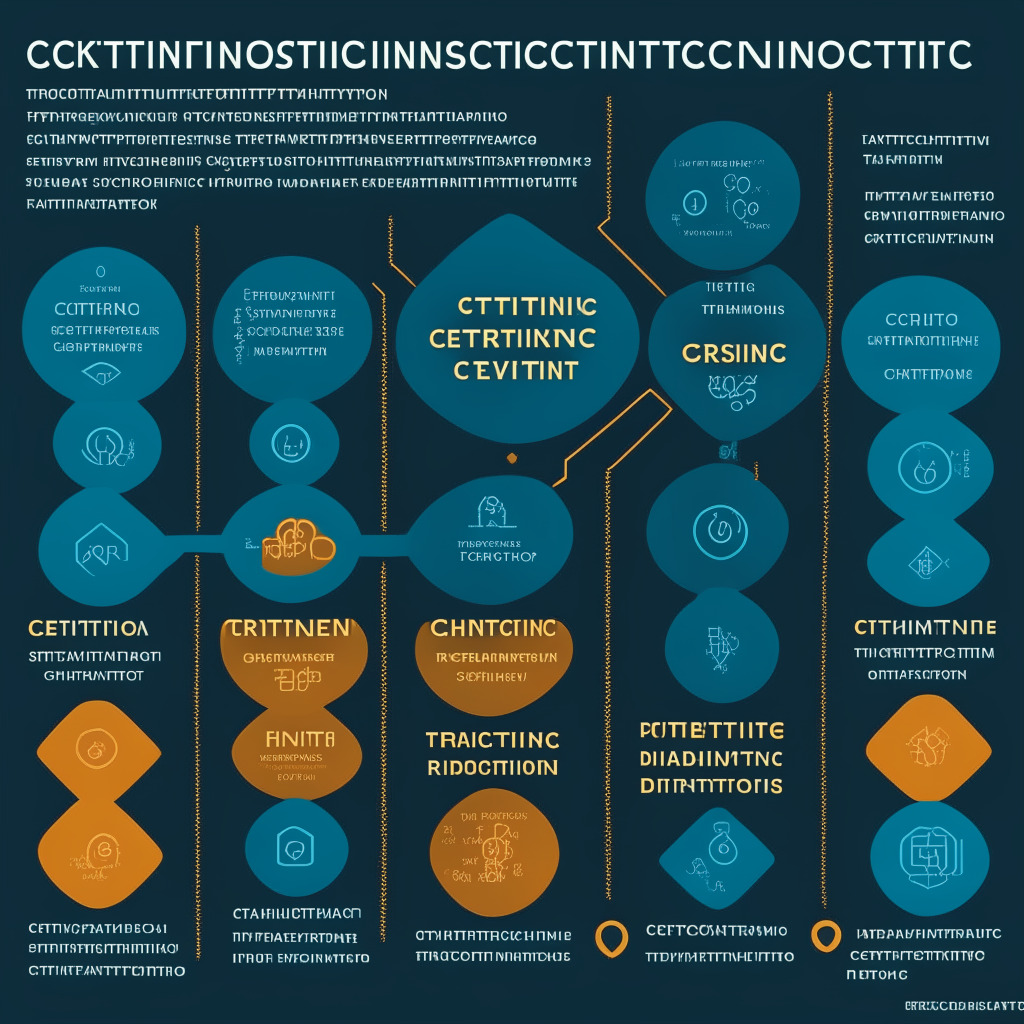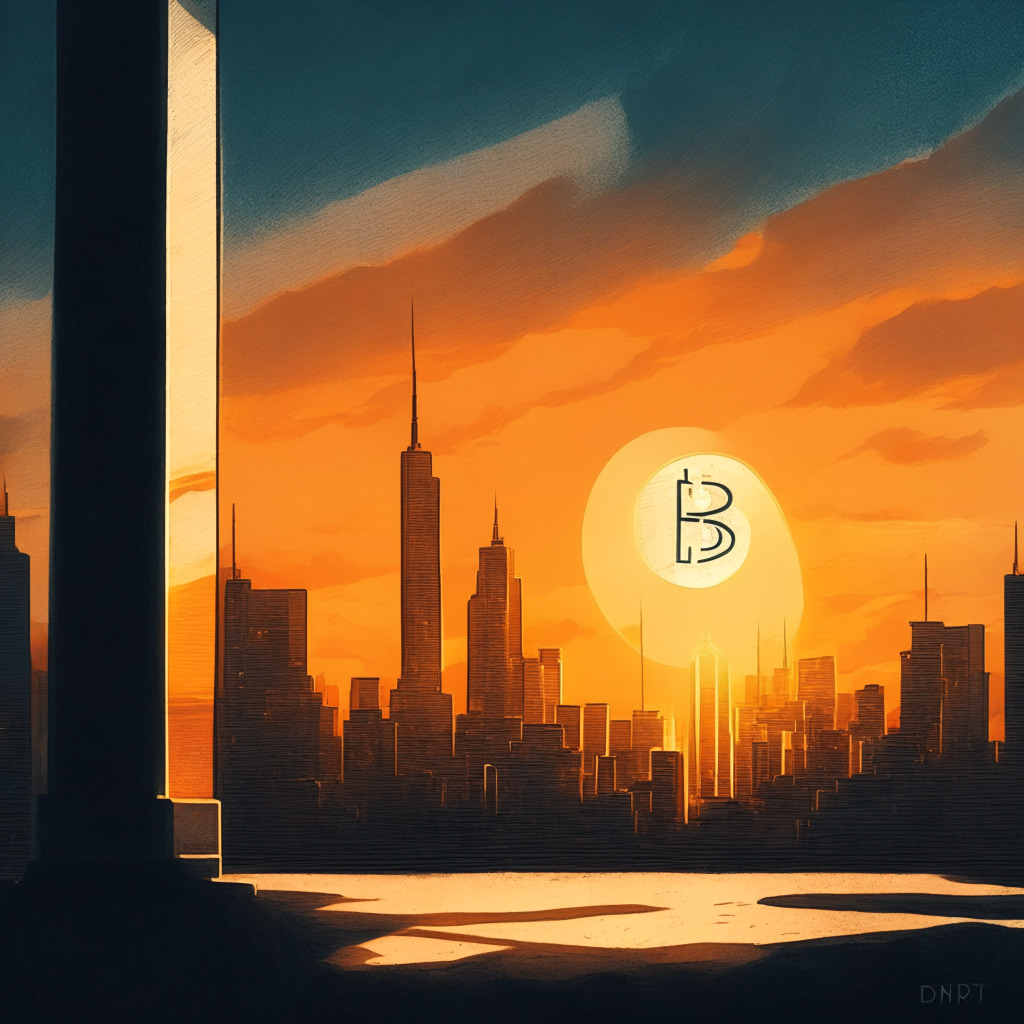Florida recently banned Central Bank Digital Currencies (CBDCs), igniting debates on the potential drawbacks of CBDCs, including surveillance and financial habit control. Governor Ron DeSantis voices concerns over central authority imposing environmental, social, and governance criteria, while proponents cite increased financial inclusion and monetary policy control benefits. The future of CBDCs in the U.S. remains uncertain.
Search Results for: U.S
Asian Markets Open: Bitcoin in Red Amid Debt Ceiling Woes and Crypto Regulation Uncertainty
Bitcoin dips below $26,500 support amid debt ceiling stalemate, inflation, and crypto regulatory concerns. Ether and major cryptos also decline, while experts highlight shifting market risks and the convergence of crypto and traditional finance regulations.
DeSantis’ Presidential Bid Stumbles: Tech Glitches, Biden’s Taunts, and the Future of Politics
Florida Gov. Ron DeSantis’ announcement of his 2024 Presidential bid faced technical difficulties during a live Twitter Spaces conversation with Elon Musk, impacting potential promotion of his campaign. The incident raises concerns about the future of technology in politics and the importance of choosing reliable communication platforms for political purposes.
Stablecoin Market Contraction: Implications for Crypto Liquidity and Recovery Prospects
The stablecoin market’s contraction for the 14th consecutive month signals a potential liquidity issue within the digital asset ecosystem. This decline may impact cryptocurrency prices, and analysts believe that sustained crypto market recovery might not occur until the stablecoin decline is curbed.
Crypto Markets Tumble Amid US Debt Ceiling Fears and UK Inflation: Analyzing the Impact
Crypto markets faced a shake-up as concerns over UK inflation and Janet Yellen’s U.S. debt ceiling warning sent prices spiraling. The Federal Open Market Committee minutes revealed divided opinions on rate hikes, affecting investor confidence. Major cryptocurrencies, including Bitcoin and Ether, experienced significant declines, reflecting reduced investor optimism.
Strike’s El Salvador Move: Growth or US Regulatory Uncertainty Escape?
Strike establishes its international headquarters in El Salvador, highlighting the country’s friendly crypto atmosphere compared to the uncertain regulatory climate in the United States. The move showcases the importance of a favorable regulatory environment for the growth of the global crypto ecosystem.
Debt Ceiling Deal Talks Loom Over Crypto Market: Analyzing Pros, Cons & Main Conflict
As the debt ceiling deadline nears, Republican leader Kevin McCarthy expresses optimism about a deal amid market uncertainty. Financial markets, including the crypto space, are impacted by the ongoing delay in debt talks. Investors should closely monitor the situation and research before making investment decisions.
US Crypto Crackdowns: CFTC vs SEC, Challenges, and the Future of Offshore Operations
The CFTC has warned crypto companies not to perceive it as a more lenient regulator compared to the SEC, as around 20% of its portfolio now consists of cryptocurrency cases. Both regulatory bodies are committed to understanding and regulating the emerging crypto market, debunking any notion of a “light touch” approach.
Bitcoin Breakout at $29,000: Analyzing Joe Biden’s Crypto Tax Remarks and Market Factors
Analyst Marcel Pechman discusses Bitcoin’s stagnation around $27,000, attributing it to macroeconomic factors. He explores the possibility of a breakout towards $29,000 but highlights less probable bullish gains due to current futures premium and options risk metrics.
Tornado Cash Developer vs Chainalysis: Balancing Blockchain Privacy, Legality & Innovation
In this article, Tornado Cash developer Alexey Pertsev has been granted permission to cross-question blockchain analytics company Chainalysis to clear his name of money laundering charges. The case raises important questions about the balance between technology innovation, privacy, legality, and regulation in the blockchain and cryptocurrencies realm.
Cryptocurrencies Fueling Fentanyl Trade: Unveiling the Dark Side of Digital Currency
Chinese chemical suppliers for Fentanyl, a synthetic opioid linked to thousands of U.S. drug overdose deaths, reportedly accept cryptocurrencies like Bitcoin and Tether. Blockchain analytics firm Elliptic published a research report identifying 80 China-based firms offering Fentanyl precursors in exchange for cryptocurrencies, raising concerns about the misuse of digital currencies for illicit substances and posing questions about regulatory efforts to combat crypto’s role in drug trafficking.
Binance Controversy: Commingling Funds Debate and Impact on Stablecoin Market
A recent report alleges that Binance commingled billions of dollars’ worth of customer funds in 2020 and 2021, using its stablecoin, Binance USD (BUSD), to credit customers’ accounts. Critics say this practice puts customer capital and assets at risk, stressing the need for transparency and reliable services in the evolving digital asset landscape.
US Debt Ceiling Dilemma: Impact on Crypto and Financial Markets, A Dual-Edged Sword
The U.S. debt ceiling deadline creates uncertainty in financial markets, affecting both traditional and cryptocurrency assets. As the U.S. Treasury risks a negative balance by Friday, negotiations on the $31.4 trillion debt ceiling raise will impact economic and blockchain future.
MicroStrategy vs Coinbase: A Safer Crypto Investment Amid Regulatory Uncertainties?
Berenberg Bank’s report suggests MicroStrategy as an attractive alternative to Coinbase for crypto investors, citing regulatory concerns for Coinbase and favorable demand drivers for Bitcoin. MicroStrategy’s unique business model focuses on acquiring and holding bitcoins, avoiding regulatory uncertainties.
Crypto Hacking Incidents Drop: A Temporary Success or Growing Security Trend?
The first quarter of 2023 saw a 70% drop in money stolen from crypto projects, with contributing factors including crackdown on hackers, legal sanctions, and anti-money laundering standards. However, TRM Labs analysts warn of a potential “rebound” in crypto hacks as the year unfolds, emphasizing the need for continued security efforts and regulatory measures.
FTX Reboot Plan: Reviving a Fallen Exchange and Addressing Security Concerns
FTX CEO John J. Ray III is working on a reboot plan for the collapsed crypto exchange, with potential investors and enhanced security measures in mind. Despite many efforts, a concrete path forward remains uncertain, as the crypto community anticipates further developments in the revival plan for FTX 2.0.
Bitcoin’s Future: Dubai Tower, NFTs, and Macroeconomic Challenges Explained
This article discusses the various factors shaping Bitcoin’s trajectory, including the celebration of Bitcoin Pizza Day and the construction of the first Bitcoin Tower in Dubai. Despite macroeconomic turbulence and liquidity fragmentation challenges, optimism and confidence in Bitcoin’s upward trend persists.
Hong Kong Opens Crypto Trading to Retail Investors: Opportunity or Risk?
Hong Kong plans to allow retail investors to trade top cryptocurrencies like Bitcoin and Ethereum, positioning itself as a dominant player in the crypto world despite regulatory crackdowns in other countries. With investor protection measures and licenses for virtual asset firms, this move attracts major crypto exchanges and presents both opportunities and challenges in the global crypto market.
Crypto Regulation Showdown: Balancing Innovation & Investor Protection in a Decentralized World
The International Organization of Securities Commissions (IOSCO) seeks public comment on policy recommendations for crypto and digital asset markets, addressing market abuse, client asset protection, and disclosures. Their Fintech Task Force aims to establish a regulatory agenda for fintech and cryptocurrency industries, with oversight from the Monetary Authority of Singapore. Recent events highlight the need for increased regulation, and IOSCO’s initiative seeks to create a more secure environment in the digital asset industry.
Crypto Trading Evolution: Hidden Road & Crossover Markets Partnership Pros and Cons
Customers of Hidden Road can soon access Crossover Markets’ crypto trading platform, helping institutions avoid conflicts of interest by separating trade execution from custody and brokerage services. The collaboration offers streamlined crypto trading but raises questions about liquidity and settlement times on an execution-only platform.
Bankruptcy Woes: Core Scientific Struggles Amid Crypto Regulation Uncertainty
Core Scientific, once the largest crypto mining company, is struggling under bankruptcy and creditor pressure amidst evolving cryptocurrency regulations. As the business landscape changes, adaptability is crucial for the ever-maturing crypto industry.
Exploring Stepn’s Move-to-Earn Game: Apple Pay Integration and NFTs in Mobile App Marketplaces
Stepn integrates Apple Pay into its iOS app’s in-app marketplace, enabling users to purchase NFT sneakers using a novel in-app currency called Sparks. This move-to-earn game app rewards players with crypto tokens as they walk or run and aims to blend blockchain gaming with Apple’s extensive reach, potentially onboarding millions of users into the Web3 domain.
AI-Generated Image Chaos: Impact on Stocks, Crypto, and the Need for Regulation
An AI-generated image depicting a false Pentagon explosion caused chaos on social media and a brief sell-off in the U.S. stock market. The incident raises concerns about unchecked AI development and highlights the importance of rigorous source verification.
Tether’s USDT: Surging Market Cap and Falling Trading Volume – What’s the Catch?
Despite Tether’s USDT stablecoin market cap surging to $83.4 billion, its trading volume has experienced a sharp decline, falling below $10 billion for the first time since March 2019. This trend raises questions about the stablecoin’s actual usage and brings concerns about USDT’s value and lack of audits back to the surface.
Cryptocurrency Adoption Amid Global Economic Unrest: Analyzing Pakistan, Nigeria, Turkey, and Japan
The cryptocurrency adoption landscape is evolving, with countries like Pakistan, Nigeria, Turkey, and Japan experiencing increased interest in digital assets to combat inflation, currency instability, and centralized financial control. Widespread adoption of decentralized digital assets may be imminent as cryptocurrencies offer insurance and hedge qualities amid global economic challenges.
Sanctions Against Binance US Investigator: Impact on Crypto Amid Russia-Ukraine Crisis
Russia expands its sanction list, including Binance U.S. Head of Investigation, BJ Kang, among 500 entities facing travel and financial restrictions. Binance is under scrutiny for reportedly generating high traffic from Russia, raising concerns over compliance with U.S. sanctions amid the ongoing Russia-Ukraine crisis.
Balancing Blockchain Privacy with AML Enforcement: A Brewing Conflict
The anti-money-laundering bill highlights the conflict between blockchain privacy and law enforcement responsibilities. As private blockchains develop and financial privacy demand grows, concerns arise over the effectiveness of AML and CFT regulations, leading to potential clashes with constitutional protections and existing legal frameworks.
Tokenization Trend Booms: $220M Market Cap, DeFi Integration, and Regulatory Challenges
Tokenization of financial securities on the blockchain is gaining momentum, with a market cap of over $220 million. Firms like Matrixport, Backed Finance, Ondo, and Franklin Templeton create tokenized government bonds and ETFs, predominantly on Ethereum. This trend enables new opportunities, improved lending efficiency, and promises innovation in finance; however, it requires a supportive regulatory landscape to reach its potential.
Debt Ceiling Negotiations: Impact on Crypto Market and US Treasury Bonds
The ongoing deadlock in US government debt limit negotiations could potentially negatively impact the crypto market. A successful deal may lead to a withdrawal of liquidity from the system, affecting bitcoin and gold prices. The crypto market could face adverse consequences due to its dependence on fiat liquidity.
BlockFi Bankruptcy Battle: Examining the Controversy and Balancing Innovation with Regulations
BlockFi’s bankruptcy battle faces tensions with creditors citing poor management and restructuring plans. A withdrawn wind-down plan suggested recovering funds through claims against commercial counterparts, but a corrective letter clarifies that soliciting acceptances remains unlawful. An upcoming hearing on June 20 will determine BlockFi’s legacy.
Uncertainty Looms: Bitcoin, Debt Ceiling Talks, Tron Rumors, and Legal Challenges in Crypto Markets
Bitcoin faces uncertainty with its price dropping below $27,000, while Tron’s TRX gains 8% on rumors of becoming legal tender in Hong Kong. Meanwhile, the Digital Currency Group struggles to repay a $630 million debt to Gemini amidst SEC accusations, and Malaysia orders Huobi Global to halt operations for unregistered activities.
Debt Ceiling Talks and Crypto: Biden and McCarthy’s Clash to Impact Market Future
As the U.S. debt ceiling deadline approaches, President Joe Biden and House Republican Speaker Kevin McCarthy’s varying viewpoints on protecting wealthy tax evaders and cryptocurrency traders may significantly impact the future of cryptocurrencies. The outcome of their discussion could reshape the crypto landscape, affecting the technology, markets, and safety of digital assets.































